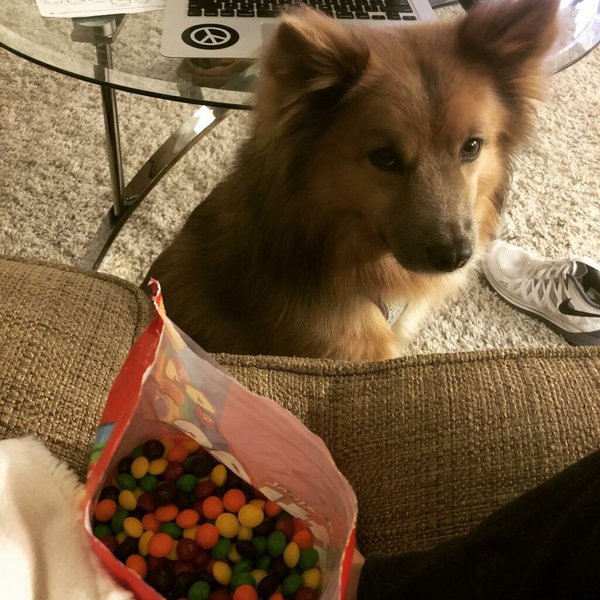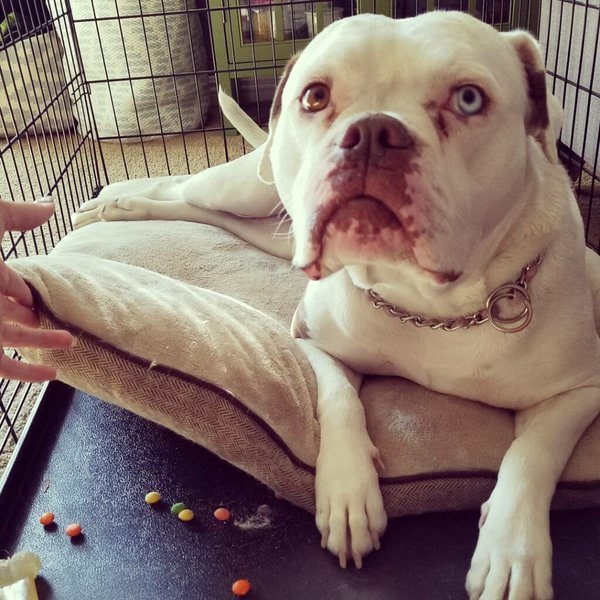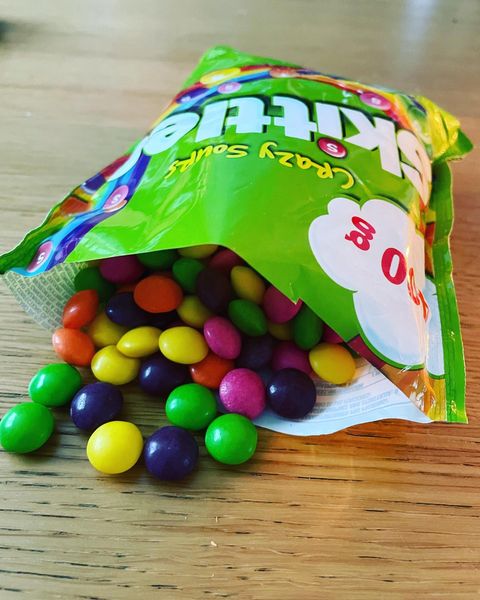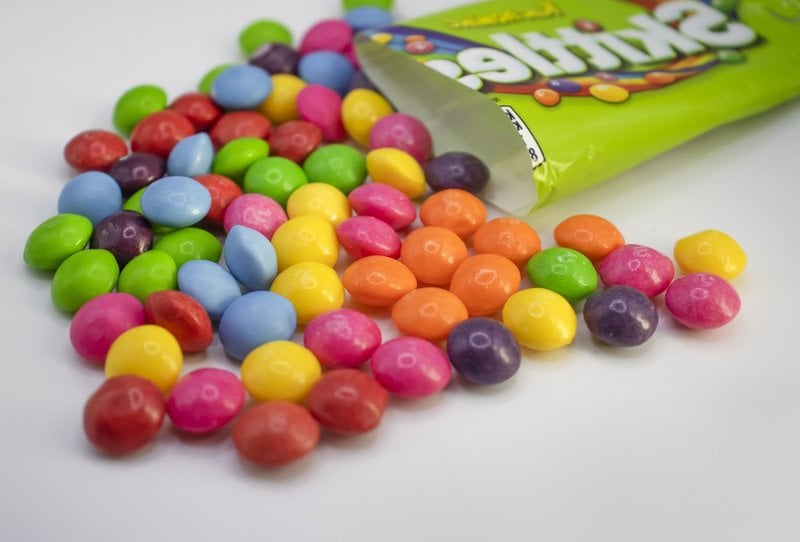Skittles are about the most popular non-chocolate candies in America. They are handy, colorful, and tasty, making them a convenient snack for any occasion. Indeed, there’ll be times your furry friend stares longingly at you, pleading for this candy. But should you oblige your Fido’s plea? Can dogs eat Skittles?
Yes, dogs may eat Skittles but only occasionally and sparingly. Skittles do not have many beneficial nutrients aside from carbs and fat. Both of these nutrients are unhealthy for dogs in excess. Eating too many Skittles can also cause serious health problems for dogs, such as diabetes and excessive weight gain.
You may wonder how many Skittles your furry friend can safely eat before this tasty treat becomes a health hazard. You may also wish to know what candies to avoid giving to your furry friend. Thankfully, this article answers these questions and even more. But first, let’s review the ingredients and nutritional content of Skittles and how they affect your pup.
Can A Dog Eat 1 Skittle?

Yes, a healthy dog can eat a few Skittles without harmful side effects.
One Skittle weighs roughly 1 g (0.04 oz), which is small enough not to cause trouble for your canine. Dogs would have to eat several Skittles before causing notable impacts on their health.
However, dogs suffering from digestive problems, pancreatitis, obesity, and any other severe ailment should not eat Skittles, regardless of quantity.
How Many Skittles Can A Dog Eat?
The quantity of Skittles a dog can eat depends on the dog’s size and overall health status.
According to the nutritional information on Skittles, about 75% of the snack is sugar! That means each Skittle you give your furry friend contains about 0.8 g of sugar, assuming each Skittle is about one gram.
Small-sized or toy dogs could safely eat at most 4 Skittles, whereas large dogs could eat more, but up to 10 at most, to stay on the safe side.
Most importantly, you should be cautious about giving your dog this snack, knowing they are primarily eating sugar. Carefully monitor your dog’s behavior or activity for unusual changes after eating Skittles.
What Happens If Dogs Eat Skittles?

One or two Skittles should not hurt a dog, but consuming many could increase the risk of your dog developing certain ailments.
While there may be no instant repercussions on dogs that eat Skittles, there will be long-term effects. Some health issues dogs may end up dealing with by eating Skittles include obesity, diabetes, and cardiovascular diseases. Let’s examine these in more detail.
Digestive Problems
One of the most common effects of sugary snacks like Skittles for canines is stomach upset. This is because dogs have different tolerance levels for sugar.
While some dogs would have to eat many Skittles before digestive problems occur, others may develop problems after eating just a few.
Again, the high sugar content of Skittles could lead to an imbalance of microorganisms in your dog’s stomach, leading to diarrhea.
Can Develop Obesity
Skittles contains a large amount of chemically synthesized sugar, increasing its calorific value. As a result, dogs are more likely to gain weight eating Skittles or similar snacks, eventually leading to obesity.
That’s because when dogs consume a high-calorie snack like Skittles, it leads to prolonged elevated blood sugar, insulin resistance, and leptin resistance. These conditions are all linked to weight gain and excess body fat.
Again, eating sugar increases dogs’ cravings, making them desire more food than they usually do.
Risk Of Diabetes
It is no secret that excessive sugar consumption by dogs increases their chances of developing diabetes mellitus, also known as sugar diabetes.
If dogs regularly eat Skittles, they risk developing this ailment, which could be challenging to manage as they age. Meanwhile, if your dog has problems producing insulin, the risk of diabetes is even higher.
Risks Cardiovascular Diseases

When dogs regularly eat Skittles or other sugary treats, they may gain weight and have increased triglyceride levels. These two conditions have well-established connections to cardiovascular problems, such as artery blockages and heart attacks.
Dental Problems
Like humans, when dogs eat sugary snacks like Skittles, they risk dental problems like tooth decay and gum disease.
Dogs wouldn’t usually swallow Skittles whole but chew them. Chewing Skittles means parts of the snack may stick to their flat teeth close to the end of their mouth and cause bacteria to grow. These bacteria could cause tooth decay or cavities in your furry friend’s teeth. Any of these dental conditions can cause your dog immense discomfort.
Are Skittles Poisonous?
No, Skittles are not poisonous since their ingredients are not toxic.
The main ingredients in Skittles include sugar, corn syrup, and hydrogenated palm kernel oil. None of these are toxic in themselves. The crucial concern about dogs eating Skittles is its high sugar content and the long-term negative impact on your dog’s health.
Again, if your dog is allergic to corn and its derivatives, keep them away from Skittles since they contain corn syrup.
Corn syrup allergies could cause dogs to experience the following symptoms:
- Excessive scratching
- Face rubbing
- Hair loss
- Hives
- Hot spots
- Irritated skin
- Persistent ear infections
If you notice any of the above symptoms in your canine friend, you should stop giving them Skittles immediately and see a veterinarian.
Do Skittles Have Xylitol?

No, Skittles do not contain xylitol as an ingredient. The compound is an artificial sweetener, which also occurs naturally in some plants. It has about 40% fewer calories than sugar and is slightly less sweet than sugar but is considered highly toxic to dogs, even in small amounts.
Although Skittles don’t contain xylitol, that doesn’t mean the snack is safe for pooches. The other ingredients are also of concern since they can cause health problems in dogs in excess consumption.
Can Skittles Kill Dogs?
No, Skittles do not contain ingredients toxic enough to kill dogs. However, dogs may develop health problems from eating Skittles because of their high sugar content, which can, in the end, prove fatal.
Can Dogs Have Sour Skittles?
No, dogs cannot have Sour Skittles even in small amounts because Sour Skittles contain fruit acids, which can cause digestive problems for dogs with stomach sensitivity.
Sour Skittles include flavors such as sour strawberry, sour green apple, sour lemon, sour orange, and sour grape. These ingredients give a tangy taste but are more dangerous than the sweet Skittle variations.
The nutritional information of Sour Skittles is similar to other varieties. Unfortunately, Sour Skittles also contain high amounts of sugar, one of the drawbacks of feeding this snack to dogs.
What Candy Is Toxic To Dogs?

Many candies are unhealthy for dogs because of toxic ingredients and/or high sugar content. Even sugar-free candy varieties are not safe for dogs since most contain xylitol, which is highly toxic.
In general, avoid giving dogs candies containing the following ingredients:
- Grapes and raisins may cause kidney problems such as acute kidney injury and anuria (a lack of urine production).
- Chocolate may cause stomach upset, nausea, vomiting, muscle tremors, seizures, and arrhythmias.
- Caffeine may raise blood pressure and cause cardiac arrhythmias.
Also, avoid candies with other known dog allergens: milk, nuts, nougats, and caramel.
Is There Any Candy A Dog Can Eat?
No candy is healthy for dogs. While many candies we eat may not affect our four-legged friends with immediate effect, the accumulated effect of these snacks, however, is harmful to their health.
In general, we recommend preventing dogs from eating candies because they offer little or no nutritional benefits for your furry friends and could cause various health complications.
Feeding candies to your dogs can result in mild to severe problems and, in worst-case scenarios, death.





